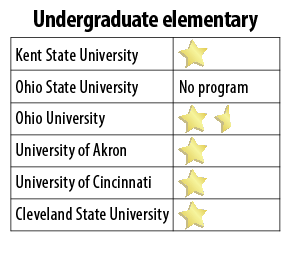Kent State education school scores poorly on debated report
June 25, 2013
Kent State ranked poorly among more than 1,100 universities analyzed in a new report on the state of teacher preparation programs nationwide.
The National Council on Teacher Quality, a research and advocacy institution based in Washington, D.C., ranked undergraduate and graduate education programs from zero to four stars in its edition of the “Teacher Prep Review.” Graduate programs at Kent State and Cleveland State received less than one star.
Undergraduate programs at Kent State, University of Akron, Ashland University, University of Cincinnati, Cleveland State University, Ohio Dominican University and Wright State University each received one star.
The Ohio State University’s graduate secondary education program received four stars. Only three other colleges in the country received four-star ratings for similar programs, leading some administrators to question the report’s methodology.
“There’s no relationship between the grades that they’ve given and how well graduates are doing,” said Daniel Mahony, dean of Kent State’s College and Graduate School of Education, Health and Human Services.
The NCTQ used 18 specific and measurable standards to rate programs, said Graham Drake, team leader of teacher preparation studies at NCTQ.
“We use publicly available information to score some of the standards,” Drake said, “but for other standards, we receive documents from the university.”
For example, to score the selection criteria standard, which rates how selective a school is in admissions, the NCTQ referenced university catalogues. For standards that required more research to score, the NCTQ requested documents from the universities.
“In most cases those documents were syllabi, but they also included other documents such as student teacher handbooks,” Drake said.
Mahony said rating programs based on syllabi and “what you could find online” is doing poor research.
“Not everything taught in a class is on the syllabus,” he said, also adding that just because something is on a class syllabus doesn’t mean the professor teaches it well.
But Cheryl Achterberg, dean of Ohio State’s College of Education and Human Ecology said the NCTQ’s criteria are fair.
“The points they looked at were important,” Achterberg said. “Curriculum is only part of the picture, but it is an important part. Curriculum is the foundation — you can’t teach what you haven’t learned.”
Mahony said the survey should look at outcomes data — data that show how well a program’s graduates are doing in the field.
Kent State earned four stars for the outcomes standard in all five of its teaching programs, yet all five programs earned two stars or less overall. The report doesn’t apply outcomes data scores to the overall scores.
Without outcomes data, there’s no correlation between the value of the program and the NCTQ’s grade of the program, Mahony said. He said the NCTQ should ask questions like, “Are superintendents who hire our graduates saying good things about them? Are they passing licensure programs?”
But outcomes data aren’t readily available in most states, Drake said.
“If we were going to wait for (outcomes data), we would still be waiting to do this review for many years,” he said.
Drake said arguing for outcomes data is like arguing that the NCTQ shouldn’t have done the study at all.
“This is not a comprehensive evaluation,” Achterberg said. “One needs to look at different evaluations and multiple measures across time.”
Achterberg said with a survey like this, schools should take the good and move on. Still, she said, “We don’t know exactly how (the NCTQ researchers) draw their conclusions.”
Mahony said the NCTQ stars system is “fairly arbitrary” though Drake said the organization’s website gives reasons for why programs did or did not meet different standards.
Fewer than 10 percent of rated programs earned more than three stars.
Mahony said he doesn’t think the low ratings of Kent State’s teaching programs will deter students from choosing the school. Potential students will do their research and talk to teachers, principals and administrators who graduated from the program. Those people will weigh in differently, he said.
Achterberg also said it’s anybody’s speculation as to whether Ohio State’s high marks will affect enrollment, although she added, “It couldn’t hurt.”
“It’s important to say we are evaluating programs — we are not evaluating schools,” Drake said. “There are different stories to be told for Kent State.”
Contact Cheyenne Perry at [email protected].












